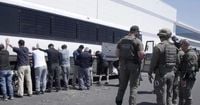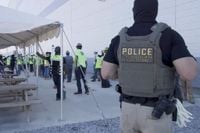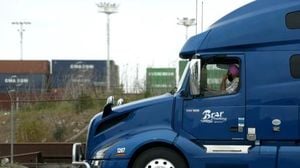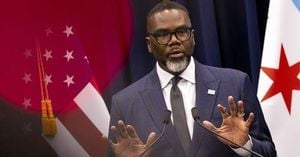In an incident that’s sent shockwaves through boardrooms from Seoul to Atlanta, U.S. Immigration and Customs Enforcement (ICE) agents arrested 475 workers at a sprawling battery factory site in Ellabell, Georgia, on Thursday, September 4, 2025. The operation, described by authorities as the largest single-site immigration raid in U.S. history, targeted a gigafactory under construction—co-owned by South Korean battery giant LG Energy Solution and automaker Hyundai Motor Company. More than 300 of those detained were South Korean nationals, a fact that has strained U.S.–South Korea relations and threatened to chill billions of dollars in planned foreign investment.
According to TIME, the raid unfolded just ten days after South Korea’s President Lee Jae Myung met with President Donald Trump in Washington. There, both leaders had pledged closer business ties, and South Korea had committed to a $350 billion investment package in the United States, including a $100 billion purchase of U.S. energy and a $150 billion project to support the American shipbuilding industry. The timing of the raid, so soon after these commitments, has left many in South Korea feeling blindsided. As the left-leaning Hankyoreh newspaper asked in a pointed headline: “Launching a massive crackdown while urging ‘investment’—is this how you treat an ally?”
The ICE operation, part of a broader campaign dubbed “Operation Take Back America,” was justified by U.S. officials as a necessary enforcement of immigration laws. Video footage released by ICE showed federal agents directing workers to line up outside the factory, some being cuffed at their hands, ankles, and waists. Steven Schrank, Homeland Security Investigations lead for Georgia, told reporters that some of the detained workers had crossed the U.S. border illegally, while others had entered legally but overstayed their visas or worked on visa waivers not intended for employment. “It’s almost certain they were there on ESTA or B-1 visas, which permit only business meetings, not construction activities,” U.S.-licensed attorney Yum Seung-yul told AFP. None of the detainees have been officially charged with crimes as of this writing, but investigations continue.
In response to the escalating diplomatic fallout, South Korean Foreign Minister Cho Hyun announced he would travel to the United States on Monday, September 8, 2025, to address the crisis. On Sunday, the South Korean government said it had finalized negotiations with the Trump Administration for the release of the detained workers, arranging a charter flight to bring them home as soon as Wednesday. South Korean Presidential Chief of Staff Kang Hoon-sik confirmed, “The Trump Administration has agreed to release the Korean nationals who could return home on a chartered flight as soon as Wednesday.”
President Trump, for his part, attempted to strike a conciliatory note while doubling down on his administration’s hardline immigration stance. On Truth Social, he posted, “I am hereby calling on all Foreign Companies investing in the United States to please respect our Nation’s Immigration Laws. Your Investments are welcome, and we encourage you to LEGALLY bring your very smart people, with great technical talent, to build World Class products, and we will make it quickly and legally possible for you to do so. What we ask in return is that you hire and train American Workers. Together, we will all work hard to make our Nation not only productive, but closer in unity than ever before.”
Trump also suggested to reporters at Andrews Air Force Base that South Korean workers could legally come to the U.S. to train Americans in battery and computer manufacturing: “If you don’t have people in this country right now that know about batteries, maybe we should help them along and let some people come in and train our people. The way you train people is to bring people in that know what they’re doing, let them stay for a little while and help.”
Yet, the damage may already be done. As Bloomberg and TIME both report, the raid has left Korean conglomerates scrambling to contain fallout and reevaluate investment plans. Ryu Yongwook, an assistant professor at the Lee Kuan Yew School of Public Policy, told TIME, “It certainly has dampened the investment sentiments and raised concerns among Korean firms on how to approach direct investment in the USA.” Tami Overby, an international business consultant, echoed this sentiment, telling the New York Times, “It had a chilling impact all across board rooms in Asia.”
The battery plant itself, a $4.3 billion joint venture, was expected to produce enough batteries for 300,000 electric vehicles annually and generate thousands of local jobs. Georgia, under the leadership of Governor Brian Kemp, has positioned itself at the heart of America’s green energy boom, with overseas firms lured by federal subsidies from the 2022 Inflation Reduction Act. But in the wake of the raid, construction at the site has been temporarily suspended, with LG Energy halting business travel and advising employees to return to South Korea. The company reported that 47 of its employees were detained, 46 of whom are South Korean. Hyundai stated that none of its direct employees were detained but is now reviewing the employment practices of its suppliers and subcontractors.
Experts warn that the delays will have a detrimental effect on the local Georgia economy. Barry Zeigler, business manager of UA Local Union 188, noted that dozens of union members had already been let go earlier this month. “The plant was meant to create jobs for locals,” he told the New York Times. Didi Caldwell, CEO of Global Location Strategies, added, “The reality is right now that there’s a workforce shortage for construction labor pretty much nationally.” Chang Sang-sik of the Korea International Trade Association put it bluntly in Bloomberg: “The U.S. is demanding investments from South Korea but is asking us to use Americans only to construct factories there. In reality, that is just impossible. They need local technicians during the construction period.”
The root of the problem, many say, lies in America’s restrictive and cumbersome visa system. The Trump Administration has tightened rules for H-1B visas, making it harder for foreign workers to enter legally. According to Chun Jong-joon, a Korean American immigration lawyer, “It takes at least 8 months of lead time before you can begin working on an H-1B, and there is no guarantee you will get it.” As a workaround, some Korean companies have used 90-day tourist visa waivers to rotate workers in and out—an open secret that, until now, U.S. authorities had largely overlooked because of the economic benefits.
Now, with the spotlight on these practices, South Korean officials are calling for a review and improvement of visa systems for business travelers and investment project workers. Ryu Yongwook argues that unless the U.S. fixes its persistent visa issues, the country risks losing its competitive edge and deterring crucial foreign investment. “Trump’s immigration policies and push for bigger foreign investment do not have to be incompatible,” Ryu tells TIME. “But for them not to be incompatible, the U.S. government must produce and apply a fine-tuned immigration policy that eases the process of foreign direct investment.”
As the dust settles in Georgia, the future of U.S.–South Korea economic cooperation hangs in the balance. The incident has laid bare the delicate dance between enforcing immigration laws and keeping America an attractive destination for global capital and expertise—an issue that will likely reverberate far beyond the fences of a single battery plant.





